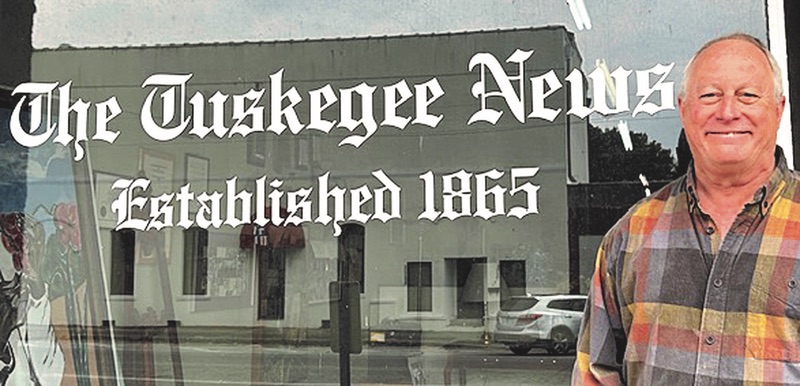Joe Turnham knew it would be cataclysmic if The Tuskegee News closed its doors.
He’s seen all the maps showing the collapse of local news. He’s seen what happens in communities that lose their local paper. He didn’t want Macon County, Alabama to join the list.
So when Gayle Davis, the then-owner of the paper in her mid-80s, was prepared to shut things down in the absence of a buyer, Turnham convinced his employer to save the day.
But his employer isn’t just any owner – it’s a taxpayer-supported government agency.
Turnham describes the Macon County Economic Development Authority as a “quasi-government” organization. They receive some taxpayer funding but also private contributions. And they’re forbidden from having any elected officials sit on their board. They also formed a separate organization, Tuskegee Media LLC, to officially buy the newspaper and oversee the operations and create some separation from the economic development authority.
Still, the idea of a taxpayer-funded agency owning a local news organization is relatively uncharted territory, at least in the U.S.
“There are two things to compare it to: one is, it not being there at all. That’s an even worse business model,” said Steve Waldman, the founder and president of Rebuild Local News, an organization that focuses on public policy solutions to the local news crisis. “(The other is) being owned by a private equity company where whatever little pennies you’re making will be sucked away.”
In 2019, the Seminole Economic Development Council in Oklahoma made a similar acquisition of three newspapers, stating at the time that their plan was to lease or sell the properties “to someone with business acumen and experience with publishing.” Currently, the SEDC continues to own the papers, but they lease the rights to the employees who worked under the previous owner who had passed away unexpectedly as they continue to search for a buyer.
“In a perfect world, we wouldn’t need things like this, but the two basic choices are going out of business or selling to a hedge fund, and this is way better than either of those and gives some real hope and runway to try to come up with a better solution,” Waldman added.
Turnham, the director of the Macon County Economic Development Authority, said the agency has been very intentional about keeping the organization at arms’ length from the day-to-day operations of the paper.
“There has been a reticence among journalists to have any sort of state intervention in the news, and I understand that on one hand when it can result in a lack of independence around editorial content,” said Jennifer Henrichsen, an assistant professor at the Edward R. Murrow College of Communication at Washington State University whose work includes researching trust in the media ecosystem. “At the same time, there are instances and examples, especially in other countries, where the support of the media from the government is crucial for it to survive.

“It’s important to make a distinction between what type of support is occurring, and what the potential ramifications or positive aspects of the type of support are. So, especially in the precarious environment that we are in these days, I don’t think it makes sense to sort of carte blanche say, ‘Oh, the government’s involved therefore it’s a bad decision.’”
Turnham said the new owners are adding a recent Auburn University graduate to join their staff and retaining their business manager and long-time editor.
The plan is to continue printing on their regular weekly schedule, but they’re also looking at building up their presence digitally, as they look to develop a sustainable business model for the long term.
“(We) hope to really build a model that works and preserve local news and the coverage of our school board and city council, county commission, sports teams, retirements and all the things that people care about,” Turnham said. “We’re reinventing ourselves, but we’re also continuing the traditions that have worked.”
With municipal elections approaching, he wants to make sure residents are able to hear directly from different candidates so they can make an informed decision when they show up at the ballot box.
In communities where local news has faded away or disappeared entirely, that process has all but vanished. Often, that means Facebook and Facebook groups fill the void and act as vehicles for spreading misinformation and disinformation.
There has been a reticence among journalists to have any sort of state intervention in the news, and I understand that on one hand when it can result in a lack of independence around editorial content. At the same time, there are instances and examples, especially in other countries, where the support of the media from the government is crucial for it to survive.
Jennifer Henrichsen, an assistant professor at the Edward R. Murrow College of Communication at Washington State University
“What we’re really trying to do, too, is to prevent social media that is not transparent from taking over the banter of news in this community,” Turnham said. “(It’s important) that we follow rules of ethical journalism in what we do — balanced stories, citing sources”
And while it might not be ideal for a government-affiliated organization to be in control of the entity responsible for covering who gets elected, Turnham just wants to keep things afloat for now.
“I go online every night and look at what’s in the bank account to see how many weeks of payroll we got left before we’ve got some problem,” he said, “but we’re treading water, and we’re still putting out a great product.”
Could this be a model for saving other local publications? Perhaps, says Waldman, despite the obvious possible conflicts.
“You could imagine a situation where the government buys the newspaper and then re-sells it to a friend or re-sells it to a political ally, so even in the interim, transitional role, there are risks to it,” Waldman said. “This is a new invention, really, and we should think through what the right rules are. From what I’ve seen, (Turnham’s) been quite thoughtful about it.
“Totally there are risks, but if you do it the right way, as these guys seem to be doing, the benefits vastly outweigh the risks because it is nearly irreversible when a newspaper like that, particularly one like that that has so much history and brand equity and trust, goes away.”
